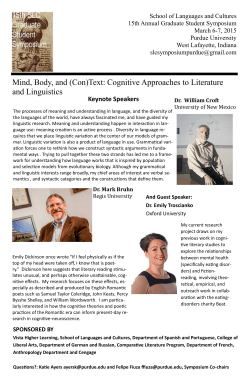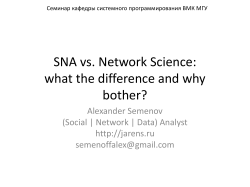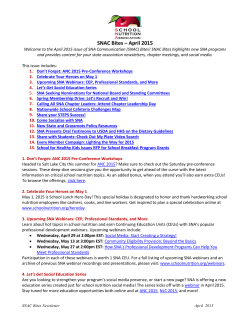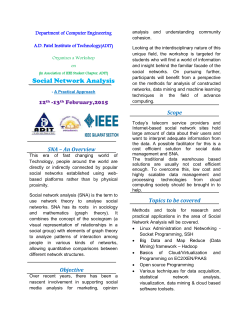
„Social networks analysis and urban languages: Theories, methods
„Social networks analysis and urban languages: Theories, methods, case studies“. Goethe University, Frankfurt 10th and 11th of April Since Labov’s pioneering sociolinguistic works, the social impact on linguistic variation and change in different language systems around the world has been subject to extensive research efforts. While mainstream sociolinguistics developed its approaches mainly from a Global Northern perspective on societies and languages, current theoretical and methodological discussion expresses the need for variation studies to take multilingual societies, language-contact issues and a more heterogeneous and dynamic understanding of linguistic systems into account. Such backgrounds of multiple language uses and enormous repertoires of multilingual variation are most typically found in Africa, particularly in settings of the rapidly growing urban areas uniting speakers with highly diverse linguistic, social and cultural backgrounds. In this specific environment, actors' social interactions rely on just these multilingual repertoires and their linguistic practices are intimately tied to social groupings in varying urban locations. From a regional point of view, Africa internal hotspots of linguistic diversity located in WestCentral Africa (here particularly in the Wider Lake Chad area) are of special interest. One current promising approach to account for the linguistic phenomena of variance and variety is Social Network Analysis (SNA) concentrating on speaker’s social interaction and its correlation with linguistic behavior. The workshop intends to bring together researchers interested in the above mentioned areas, i.e. the field of variationist sociolinguistics in African language settings with a thematic focus on urban language practices and a regional focus on Northern Cameroon. A further general idea of the workshop is to discuss whether and how the SNA can be fruitfully adapted to research on contact-induced variation in African urban linguistic varieties. On this note, the workshop is purposed as a platform of discussions on current theories as well as researcher’s experiences and visions. Compared to SNA applications in more homogenous speech communities mostly situated in the Global North, the implementation of SNA in African settings has been very restricted and comparatively scarce. Although it is by now widely accepted that multilingual repertoires of speakers are rather the rule then the exception in Africa, empirical research taking this reality theoretically and methodologically into account is still rare. For instance, it is only in most recent research that the SNA has been applied to the specific societal and multilingual conditions in rural (Upper Sourou Valley, Burkina Faso/Mali) and urban Africa (Zuiganchor/Senegal). Apart from these incipient studies, Africa internal hotspots of linguistic diversity in West-Central Africa are not being included in current projects centering on variety and variance in the framework of SNA so far, and, thus, constitutes a veritable empirical gap. The Wider Lake Chad area (including contiguous regions in Chad, Cameroon and Nigeria) is considered as such a linguistic hotspot, particularly in view of genetic affiliation as well as the mere number of languages spoken there. The workshop thus intends to address questions like the following: What are the findings of empirical based studies on linguistic variation and variance in language systems of Africa, particularly in urban settings and settings within the Wider Lake Chad area? How can the SNA approach be applied to communities of linguistic practices in Africa? What are the main methodological obstacles and how can we overcome them? Are there typical locations where urban varieties develop (e.g. markets, bus stations, schools) and are there recurrent connections between the emerging variations and the type of location where they develop? What are characteristic features of actors in these locations? How can they be identified? Is the SNA feasible at all and which additional techniques do we need? How can we assess variation in a linguistic setting where today's deviation may be tomorrow's norm and where things are constantly in flux? Do we need whatever kind of 'descriptive standard' as backdrop for the analysis? What are the necessary ingredients for such a construct? The workshop invites researchers from the field for a two-day meeting in Frankfurt/Main (Friday 10th and Saturday 11th). Apart from the invited speakers, the workshop is open for any interested scholars.
© Copyright 2025





















